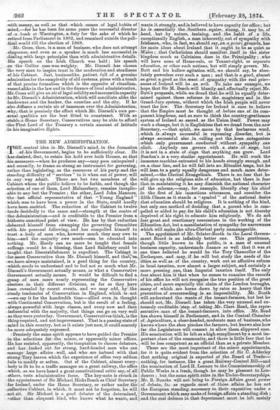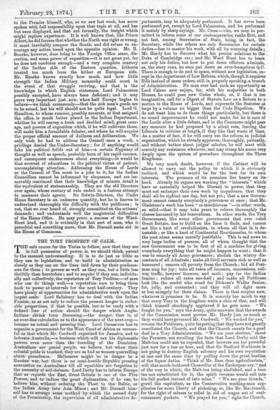THE NEW ADMINISTRATION.
THE central idea in Mr. Disraeli's mind, in the formation of his Government, begins to be sufficiently clear. He has desired, first, to retain his hold over both Houses, so that his measures--when he produces any—may pass unimpaired ; and secondly, to frame as strong an instrument for governing, rather than legislating, as the resources of his party and the atanding difficulty of " services " to it when out of power, will in any way admit. There are but two members of the Cabinet whom the public believe to be feeble, and though the selection of one of them, Lord Malmesbury, remains inexplic- able to any but the Premier ; the other, Lord John Manners, the last official representative of that "Young England " which was to have been a power in the State, could hardly have been omitted. The reduction of the Cabinet to twelve tends decidedly to the same end—strength at the centre of the Administration—and is creditable to the Premier from a hitherto unnoticed point of view. He has by that reduction debarred himself from swamping the governing Committee with his personal following, and has compelled himself to trust a body of men who, however much they may owe to him—and the majority owe much—can be educated into nothing. Mr. Hardy can no more be taught that female suffrage would be a blessing, than Lord Salisbury could be taught that Disestablishment is expedient. The Cabinet is far more Conservative than Mr. Disraeli himself, and that, as we have always maintained, is a good thing for the country, which needs to understand and to feel not so much what Mr. Disraeli's Government actually means, as what a Conservative Government actually means. It would be difficult to find a group of men more nearly representing the Conservative electors in their different divisions, so far as they have been revealed by recent events, and we may add, by the steady tendencies of Conservatism in England, which is not —we say it for the hundredth time—allied even in thought with Continental Conservatism, but is the result of a feeling, always powerful with large classes, and every now and then influential with the majority, that things can go on very well as they were yesterday. Government, Conservatives think, is the thing required, and not improvement. That is a passing state of mind in this country, but as it exists just now, it could scarcely be more adequately expressed.
Precisely the same spirit appears to have guided the Premier in the selections for the minor, or apparently minor offices. He has resisted, apparently, the temptation to choose debaters, and has looked out for strong, hard-headed men who can manage large affairs well, and who are imbued with that strong Tory leaven which the experience of office very seldom fails to modify or soften. Out of the Cabinet, almost every- body is fit to be a traffic manager on a great railway, the office which, as we have heard a great constitutional critic say, of all others, tests administrative force. The key-note is struck in the appointment of Sir Michael Hicks Beach as Chief Secretary for Ireland, under the Home Secretary, or rather under the collective Cabinet, in which, it must not be forgotten, he will not sit. Sir Michael is a good debater of the determined, -ether than eloquent kind, who knows what he wants, and
wants it strongly, and is believed to have capacity for office ; but he is essentially the Southern squire, strong, it may be, of head, but by nature, training, and the habit of a life, exceptionally English, a man inherently out of sympathy with Irishmen, who, in fact, we should say, on a priori grounds, has for main ideas about Ireland that it ought to be as quiet as Wales ; that Catholicism should manifest itself in the sister kingdom much as Calvinism does in the Principality ; who will have none of Home-rule, or Tenant-right, or separate education, or other such notions, but will simply govern. Mr. Butt and his hollow agitation will, we should say, be abso- lutely powerless over such a man ; and that is a good, almost as great a good as the want of sympathy with the real griev- ances of Ireland will be an evil. To take one example, we hope that Sir M. Beach will bluntly and effectually reject Mr. Butt's proposals, while we dread that he will be equally deter- mined against those reforms in the magistracy and in the Grand-Jury system, without which the Irish people will never trust the law. The Secretary for Ireland is sure to believe that the Empire must be thought of before one of its com- ponent kingdoms, and as sure to think the country-gentleman system of Ireland as sacred as the Union itself. Power may work a change, but it is Englishism that we dread from the new Secretary, — that spirit, we mean by that barbarous word, which is always successful in repressing disorder, but is always successful also in calling out the keen antagonism which only government conducted without sympathy can elicit. Anybody can govern with a state of siege, but it is not in a state of siege that anything can grow. Lord Sandon's is a very similar appointment. He will work the immense machine entrusted to his hands strongly enough and on a clear line, and he will fall into no Ritualist traps, but he will lean to a party equally dangerous and much more deter- mined,—the Clerical Evangelicals. There is no fear that he will give up the religious side of education, but there is fear that in maintaining it he may diminish the national character of the scheme,—may, for example, literally obey his chief in the first of his incautious utterances, and consider the 25th Clause as it stands a " symbol " of the national desire that education should be religious. It is nothing of the kind, but only one method of deciding that a parent who is com- pelled or aided to pay for his child's education is not thereby deprived of his right to educate him religiously. We do not fear great and reactionary concessions in the working of the Education Act, but a manifestation of sympathy for narrowness which will make the ultra-Clerical party unmanageable.
The appoinment of Mr. Sclater-Booth to the Local Govern-
ment Board is an infinitely better one. This gentleman, though little known to the public, is a man of unusual business capacity, understands finance so well that it was at one time believed he would be the Tory Chancellor of the Exchequer, and may, if he will but study the needs of the cities as well as of the country, work out an effective reform in local taxation, now almost a larger subject, and certainly a more pressing one, than Imperial taxation itself. The only fear about him is that when he comes to examine the records of his office he will not recognise the true position of the great cities, and more especially the claim of the London boroughs, many of which are borne down by rates so heavy that the prevention of overcrowding is an impossibility. Mr. Booth will understand the wants of the tenant-farmers, but lest he should not, Mr. Disraeli has taken the very unusual and ex- tremely creditable 'step of taking Mr. Clare Read, the repre- sentative man of the tenant-farmers, into office. Mr. Read has shown himself in Parliament, and in the Central Chamber of Agriculture, a clear-headed, moderate man of business,who knows where the shoe pinches the farmers, but knows also how far the Legislature will consent to allow them slippered ease. His nomination will be felt as a high compliment by a most im- portant class of the community, and there is little fear that he will be less competent as an official than as a private Member.
These are the most important of the minor appointments, for it is quite evident from the selection of Sir C. Adderley that nothing original is expected of the Board of Trade- ! nothing, for instance, like a great Railway-Control Bill—and the nomination of Lord H. Lennox to the Commissionership of Public Works is a freak, though he may be pleasant to Lon- doners ; but the same spirit rules in the Under-Secretaryships. Mr. R. Bourke will not bring to Foreign Affairs great power of debate, fo„. as regards most of those affairs he has not the European standing necessary to their exposition under a Government which may make of foreign affairs a standing dish ; and the real defence in that department must be left mainly
to the Premier himself, who, as we saw last week, has never spoken with full responsibility upon that topic at all, and has but once displayed, and that not formally, the insight which might replace experience. It is well known that, like Prince Albert, he did foresee that whether the North was right or wrong, it must inevitably conquer the South, and did refuse to en- courage any action based upon the opposite opinion. Mr. R. Bourke, however, does bring to the Foreign Office sense, dis- cretion, and some power of exposition—it is not great yet, for he does not condense enough—and a very complete mastery of the farther side of the Eastern question, hitherto treated too much from the hither or European side. Mr. Bourke knows exactly how much and how little strength the Indian Military monarchy could exert in the event of that struggle reviving, and that is the knowledge in which English statesmen, Lord Palmerston possibly excepted, have always been deficient; and it may prove very important just now, when half Europe begins to believe—we think erroneously—that the sick man's goods are to be seized, lest his will should not be quite legal. Lord G. Hamilton, to whom rumour, possibly accurate, at first assigned the office, is much better placed in the Indian Department, whither he will convey a fresh and decided mind, great cour- age, and powers of exposition which, if he will cultivate them, will make him a formidable debater, and where he will acquire the proper official amount of dullness and deliberation. We only wish he had to address the Council once a week, a privilege denied the Under-Secretary ; for if anything would take his political foible out of him—a certain flippancy of thought as well as speech, probably born of his rapid success, and consequent cocksureness about everything—it would be that severest of educations in the political virtue of patient, uncomplaining attention. Addressing the House of Lords or the Council of Ten must be a joke to it, for the Indian Councillors cannot be influenced by eloquence, and are im- movably convinced that their knowledge of minute detail is the equivalent of statesmanship. They are the old Directors over again, whose century of rule ended in a furious attempt to massacre their agents. Sir Selwin-Ibbetson, the Under Home Secretary is an unknown quantity, but he is known to understand thoroughly the difficulty with the publicans ; is not, that we ever heard of, strongly committed on the artisans' demands ; and understands well the magisterial difficulties of the Home Office. He may prove a success of the Ward- Hunt kind, and it is evidently in that sort of man, who is parochial and something more, that Mr. Disraeli seeks aid in the House of Commons.



































 Previous page
Previous page